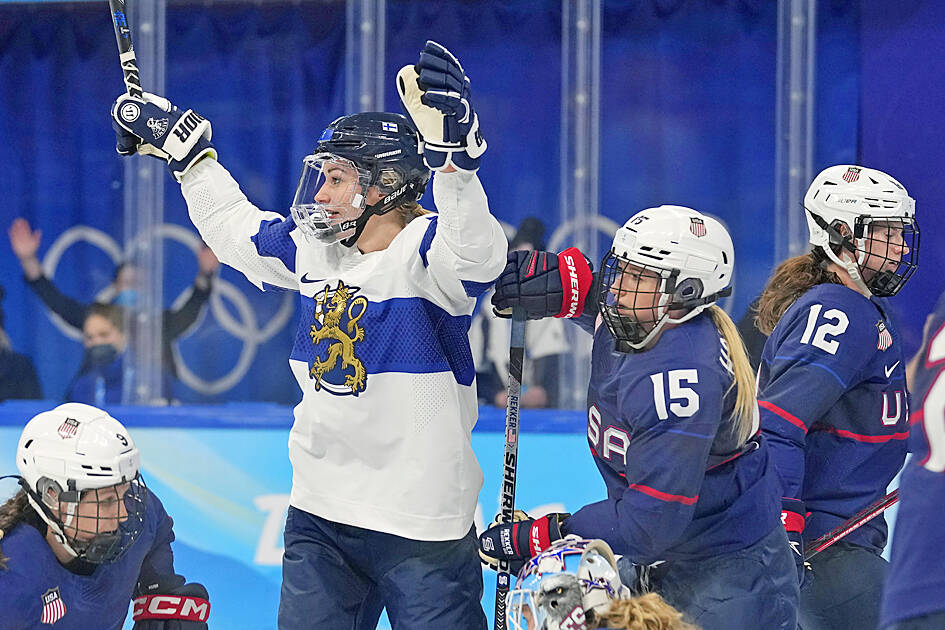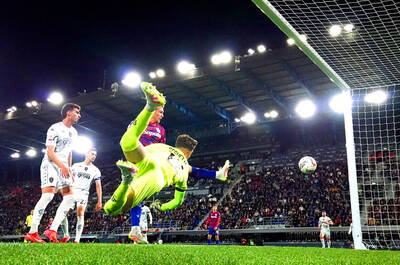Jet-lagged following a transatlantic flight after spending a weeklong stretch with Finland’s national women’s hockey team, Susanna Tapani was in the back of a cab headed to her adopted new home in the Twin Cities upon learning she had been traded to Boston.
“I’m pretty sure I was kind of like laughing and I was like in a shock,” Tapani said this week, recalling her surprise in being part of the newly launched Professional Women’s Hockey League’s (PWHL) first trade on Sunday last week.
“I didn’t even make it home, and you’re telling me that I got traded,” Tapani said, remembering what she told Minnesota general manager Natalie Darwitz.

Photo: AP
“It was like: ‘Oh my God. OK.’ It was hard to believe,” she said.
It was a reminder about the reality of the professional ranks for Tapani and Minnesota teammate Abby Cook, who were shipped to Boston, as well as for Sophie Jaques heading the other way in the three-player swap.
“I didn’t see it coming,” Jaques said. “I honestly don’t think it set in until I stepped on the ice here in Minnesota.”
While the prospect of being traded was always a possibility for those competing in the six-team PWHL, the reality of a deal being struck some six weeks into the first year was still considered stunning in a sport where in-season player movement was a rarity.
Historically, most female players in the US spent much of their careers tied to one or two places, be it their respective colleges or national teams and those who pursued careers in previous pro leagues generally stayed put because they had secondary jobs, and their playing salaries were too low to cover the cost of packing up and moving at a moment’s notice.
What is changed with the PWHL is a salary structure ranging from US$35,000 to US$80,000 not including bonuses, coupled with a collective bargaining agreement that features monthly US$1,500 housing stipends and compensation for relocation costs.
The trade became the first to put relocation clauses to the test, while creating some initial confusion among the players involved.
Jaques and Cook left their cars behind, unsure of how to get them to their new cities.
A Google search showed that the cost of shipping a car from Boston to Minnesota ranges from US$771 to US$1,205.
The PWHL caps relocation expenses at US$2,500 and has no additional provision for car shipments.
Another issue players are awaiting feedback on is how the process works with having to break their leases, for which the PWHL provides up to US$1,500 in compensation.
Jaques has the benefit of being reunited with former Ohio State teammates Liz Schepers and Clair DeGeorge in Minnesota. Schepers already has Jaques living in a spare bedroom of her home.
“If I didn’t have them two, I think I would be a lot more lost,” Jaques said.
Cook said PWHL officials have been in contact to help with the challenges of relocation.
“They’ve been asking and trying to learn about what we’re going through, so yeah, I think it’ll be different for the next lucky girl that gets traded,” Cook said.
There is anticipation that more trades will happen before the deadline next month.
“When that first one happens then it snowballs,” Darwitz said. “I was reached out to about another potential trade, but it’s like: ‘Hey, just because I made one isn’t like I’m going to be shooting from the hip here and doing a bunch.’”
At 30, Tapani is accustomed to change, having previously played in pro leagues in Finland, Sweden and Russia. It helped, too, that she was traded with Cook, who was her roommate this season.
“If this would have happened to me like 10 years ago, I think I would have felt different,” she said. “I just try to be myself and play to my strengths. I knew that it’s a possibility to get traded, but it’s definitely a professional league, and it’s a business. You just have to prepare for anything.”

Bologna on Thursday advanced past Empoli to reach their first Coppa Italia final in more than half a century. Thijs Dallinga’s 87th-minute header earned Bologna a 2-1 win and his side advanced 5-1 on aggregate. Giovanni Fabbian opened the scoring for Bologna with a header seven minutes in. Then Viktor Kovalenko equalized for Empoli in the 30th minute by turning in a rebound to finish off a counterattack. Bologna won the first leg 3-0. In the May 14 final in Rome, Bologna are to face AC Milan, who eliminated city rivals Inter 4-1 on aggregate following a 3-0 win on Wednesday. Bologna last reached the

If the Wild finally break through and win their first playoff series in a decade, Minnesota’s top line likely will be the reason. They were all over the Golden Knights through the first two games of their NHL Western Conference quarter-finals series, which was 1-1 going back to Minnesota for Game 3 today. The Wild tied the series with a 5-2 win on Tuesday. Matt Boldy had three goals and an assist in the first two games, while Kirill Kaprizov produced two goals and three assists. Joel Eriksson Ek, who centers the line, has yet to get on the scoresheet. “I think the biggest

From a commemorative jersey to a stadium in his name, Argentine soccer organizers are planning a slew of tributes to their late “Captain” Pope Francis, eulogized as the ultimate team player. Tributes to the Argentine pontiff, a lifelong lover of the game, who died on Monday at the age of 88, have been peppered with soccer metaphors in his homeland. “Francisco. What a player,” the Argentine Football Federation (AFA) said, describing the first pope from Latin America and the southern hemisphere as a generational talent who “never hogged the ball” and who showed the world “the importance of having an Argentine captain,

Noelvi Marte on Sunday had seven RBIs and hit his first career grand slam with a drive off infielder Jorge Mateo, while Austin Wynn had a career-high six RBIs as the Cincinnati Reds scored their most runs in 26 years in a 24-2 rout of the Baltimore Orioles. Marte finished with five hits, including his eighth-inning homer off Mateo. Wynn hit a three-run homer in the ninth off catcher Gary Sanchez. Cincinnati scored its most runs since a 24-12 win against the Colorado Rockies on May 19, 1999, and finished with 25 hits. Baltimore allowed its most runs since a 30-3 loss to